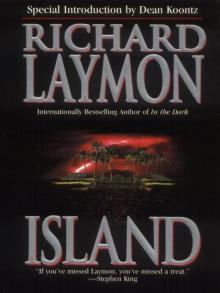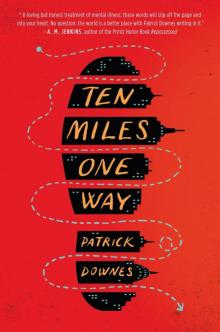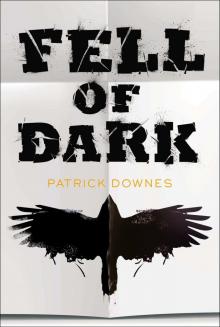- Home
- Patrick Downes
Island Page 11
Island Read online
Page 11
Dad: I want to stay here with your mother.
Me: Shouldn’t we take you to a doctor? Shouldn’t we see what’s going on?
Dad: Why?
Me: What if you get attacked with that headache when you’re down in the ravine? You could throw yourself off the platform.
Dad: Yes, that’s possible.
Me: That’s a problem.
Dad: Is it? Why?
Key and me: ?
Dad: I want to live out my life here. With you and Diane.
Key: Okay, Dad.
Dad: That it? No more questions?
Me: No, Dad.
Dad: I’m going down to sit. The birds, you know? They’re back. And the trees with all their baby leaves. The ravine.
My father stood up to go.
“I’ll go with him,” my mother said. “Even though I hate the ladder.”
* * *
ı
Over the last six months, my father’s memory was hit or miss. This made things easier and harder. He seemed calmer, always on his best behavior, polite and gentle, like a guest among strangers. As if he were a lodger without any real connection to anyone or anything around him. Most of the time, though, he kept to himself. He wandered through the house, room to room, muttering, stopping for a few moments as if he’d forgotten where he’d been or where he was going. And he sat down behind the house in his broken chair, looking off across the ravine, looking down, looking inside himself, talking with his dead wife.
The hard part was logistics. Since Key and I agreed not to take our father to a doctor or a hospital unless he needed urgent care, we made sure one of us was always home. We had to know where he was in the house or outside, and we had to make sure he ate, got cleaned up, slept. We kept watches going at night. This meant we traded days at school and figured out weeks when one or the other of us worked more hours at the restaurant. And we agreed to start repairing and renovating the house little by little. Our Plan B, if taking care of our father became too frightening or if we drowned in it, was to sell the house and get him other help. Maybe he would end up dying in a hospital after all.
We didn’t really know anything. We were just trying to do our best.
And Key was home alone when our father came at him.
I walked through the front door just as —
“Stop!” I shouted it.
My father held Key against the dining-room wall by the throat, his fist pulled back. Key, bleeding.
I couldn’t reach my father before he threw his punch. And my brother crumpled.
I tackled my father, threw him to the floor.
He fought. He writhed and threw out his fists, looking to land whatever punch he could, looking to damage, howling.
Heavier at last, stronger, I clamped my father’s wrists against his chest.
I would have killed him. Pure instinct. Pure violence.
“No.” My mother at my back. “Rad, no.”
I was driving my father’s own hands against his throat. His rage turned to deep fear. I’d strangle him with his own hands.
“No, Rad.” My brother behind me, his hands on my shoulders. “Please, no.”
I’d crush the air out of my father.
“Konrad.” My brother, my mother.
My father’s face a map of terror.
“Rad, I’m hurt.” My mother? My brother? Which?
“I’m hurt. Don’t do this. I need you.”
And I released my father.
My father, on the floor, curled up, and my mother slapped him. She slapped him hard. “What did you do, John?” My mother, shouting. “What did you do?”
My father hit himself. He hit his head again and again. He would have beaten himself to death, I think, if that were possible.
I did what I could to stop him. I pulled at his arms, and I tried to block his fists. He had new strength.
And then my ghost mother fell on my father.
No, not my mother. My brother. Key climbed onto my father, elbowing me aside, covering him with his body, shielding my father’s head from his own fists.
My father was screeching, howling. He was caught under lightning and waves of rain. He was caught by an attacking ocean.
He was a small island, inundated, going under.
My father might have been me. I could see it, see myself. And I felt ashamed. I saw myself in my father, out of control, unable to be consoled or stopped, dangerous.
At last, he collapsed under my brother.
Key had taken more punches. He was badly bruised, bleeding, but alive. He was still holding onto our father.
“Come on,” I said. I tried to scoop Key away, but he resisted. “Come on. Leave him be.”
Key let me lift him up from the floor, and my father rolled away, covering his face with his hands.
I went to the kitchen for ice, ice for my brother’s face, for my father’s, and towels.
When I returned, my father was turned against the wall. And Key was lying down behind him, pressed up close, his hand on my father’s shoulder.
My brother was love.
NINE
Key and I face each other in the kitchen of our run-down, worn-out house. I’ve broken a pitcher, pounded a table, punched a refrigerator.
Our father is dead.
We’ll have to call the police. I’d wanted to understand what had happened between Key and my father as they stood on the platform. I’d wanted to understand how my father came to fall, but I don’t think it matters anymore. Or that it matters beyond the more important truth: that my father is gone, released from himself — and that we, Key and I, are free.
I feel strange. I feel something I may not have felt in a long time, if ever. It feels warm. It feels easy. It feels like control.
Light streams through the windows. My father’s ghosts have disappeared. And I’m breathing, steadily, slowly.
I’m at peace.
That’s what this is. It’s peace.
Jacqui.
I want to call her like I promised. I want to say, “My father’s dead.” I want to say, “Let’s talk.”
“You,” I want to say. “I really only want you.”
I sit back down across from Key.
“I’m sorry for how I’ve acted,” I said. “Sorry for being me. You’re my brother, and I —”
“I love you, too.”
Silence.
“Key?”
My brother looks at me, drawn and pale, exhausted, his face still swollen, purple from the beating he took two days ago.
“Why did you go down the ladder in the first place?”
“I saw him down there from my room. He was standing right at the edge of the platform. I was scared he would let himself go over. I thought I’d help him back up.”
Silence.
“So you went to him, and can you tell me about the dream, Key? What came over you?”
“I’m not sure I can say.”
“There will be questions, Key, and I want to understand, if it’s possible.”
“A dream, when you describe it, always comes out boring or confused. This wouldn’t be any different.”
“Except Dad dies at the end.”
Key looks at me closely. “Something has changed.”
“Where?”
“In you.”
“I don’t know how to describe it.”
“Relief,” Key says. “I feel it, too, which is why I’m shaking. I’m falling apart from relief.”
* * *
ı
We stood there, Rad. We stood there a long time looking at each other, Dad and I. I had my circular breathing, and I was praying. Have mercy on us, have mercy on us, over and over. I was talking to any god who would listen. Dad was smiling. I couldn’t tell if he could hear me. He said nothing at all. I looked in
to his eyes. He was near and far.
I could sit here and tell you what I saw if you want that. I saw his entire life. I watched his parents die of disease, and his insane uncle go into the hospital again and again. I watched Dad paint hundreds of paintings, draw thousands of pictures, and I watched him sketching out the faces of the people around him, doodling mazes in his class notes. I watched him sleep and eat and drink and meet Mom. I watched him take care of her when she was pregnant with us. I watched him at law school, studying, arguing, hating every minute, and I watched him pass the bar. I watched him juggling cleavers, jumping on a bed. I watched him loving us, loving Mom, and I watched him lose it all. I watched him punch his client and his boss. I watched him doubt. He was so afraid. I watched him give up on us, on Mom. I watched him sleeping with Mom, always with his hand on her, comforting her, letting her know he was right there, wouldn’t leave, and I watched him torment her. I watched his whole life come undone. I watched him lose Mom and bury her. I watched him grieve. And I watched his mind die.
We were standing in clouds and in oceans and in tall grass. We were standing on the platform he’d made. We were hugging each other and looking at each other with a thousand miles between us, a million miles. The whole time, I was breathing in and out at the same time, and I heard talking inside myself. A new prayer: Be love.
And then Dad spoke, or tried to speak. I couldn’t hear him, Rad. I couldn’t hear him because he was standing on, I don’t know, an island. An island with strange life. Birds with two sets of wings, giant birds with headdresses and with tails that stretched behind them fifty feet. Wildcats that walked upright and miniature monkeys the size of acorns. And bright flowers with blue teeth. He was standing on an island at the other end of an immense ocean, holding his hands up to his mouth, shouting.
I strained to hear him, but I could only hear myself: Be love.
I reached out across the whole ocean toward his island. I wanted to touch him, Rad. I wanted to tow him in, island and all. I wanted to be love. But he was gone.
* * *
ı
What had my father done if not let himself fall?
Could this be called a suicide?
Maybe my father thought he was falling backwards into an ocean that would carry him away from his island toward the mainland he had somehow lost.
Or maybe he didn’t fall at all. Maybe he dived into his ocean with every intention to swim across all the way home to us.
I don’t know. No one will ever know. Key and I can only imagine.
Key cries.
I let him. I don’t stop him with my own outburst, my own emotion. I don’t stand in the way. I don’t interrupt him. I take my brother’s hand, and he cries. He cries for everything, everyone. He sobs with relief.
I would watch my mother cry, too, if she were here. If my ghost mother came here to cry for herself, for her husband, for her sons, I would let her. Hasn’t she earned the right to be sad? Hasn’t she earned the right to wish she were alive?
My mother doesn’t come. My mother won’t come again.
I watch my brother cry for what seems like a thousand years.
When my brother stops crying, we’ll call the police. We will tell them we found our father. We will tell them he’s been sick for a long time, and we’ve been taking care of him. No, we will say, we have no mother. No, we will say, we tried our best. Our father, he was sick, his mind, but we did our best.
The police will shake their heads. They will believe us. And they will go.
Key and I will bury our father. We’ll bury him next to our mother.
My brother and I will sell the house and rent an apartment. We’ll work. We’ll finish our last year of high school.
And when the time comes, my brother will go into his life, and I will go into mine. He will become something remarkable. He will become love while I find my island. We will always be twin islands, close and far at the same time. Maybe I’ll end up a monk off the coast of France, or as a hermit on some tiny island in the south Pacific, or as something altogether different. Maybe I’ll surprise myself and stay on the mainland, part of the continent. Part of Jacqui.
Right now, though, my brother cries. And as he cries, I’ll watch you walk away. I’ll watch you keep to the bridge we made. You’ll head back to your country, your island. I’ll watch your back until you’re out of sight.
Patrick Downes’ first two novels for young adults, Fell of Dark and Ten Miles One Way, received multiple starred reviews and were named to best-of lists (NYPL Best Books for Teens, Booklist Top 10, Kirkus Best Teen Reads). He is also the author of Come Home, Angus (illustrated by Boris Kulikov), a picture book. A New York City native, Patrick divides his time between the United States and Canada.

 Island
Island Ten Miles One Way
Ten Miles One Way Fell of Dark
Fell of Dark